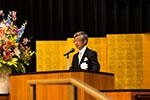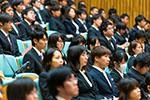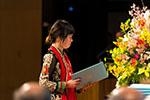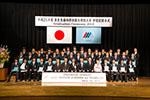2014/04/17
On Monday, March 24, 2014, a graduation ceremony was held in the Millennium Hall and 392 students received diplomas.
At the ceremony, President Ogasawara handed over diplomas to the students and gave them a congratulatory speech, followed by the speech of Mr. Hiroshi Koyama, the Executive Director of the Foundation for Nara Institute of Science and Technology.
Then Best Student Awards were conferred to 14 winners by the Foundation.
At the party held after the ceremony, graduates enjoyed the party together with President, Executive Directors and their supervising professors in a friendly atmosphere.
*Number of Graduates in March
[Master's Graduates]
Information Science 130 (16 International students)
Biological Sciences 115
Materials Science 98 (4 International students)
[Doctoral Graduates]
Information Science 20 (4 International students)
Biological Sciences 9 (1 International students)
Materials Science 18 (2 International students)
[Graduates who completed the Doctoral program by submitting the dissertation]
Information Science 2
[Congratulatory Remarks to the Graduating Students, Graduation Ceremony, Spring 2014]
I would like to congratulate the 49 doctoral program students and 343 master's program students that received their degrees today. Including you all, NAIST has awarded 6249 master's degrees--passing the 6000 mark--as well as 1225 doctoral degrees. Among these graduates, there are 27 international students from 13 countries around the world. I am proud to see our network of graduates continuing to expand not only in Japan, but also overseas.
In addition to the graduates themselves, I would like to congratulate the graduates' families and express my gratitude on behalf of NAIST for your support of the graduates and their studies here. Furthermore, I would like to convey my sincere appreciation to all of the individuals and organizations that have generously supported our international graduates with their studies and their daily lives.
A number of today's master's program graduates will continue on to rigorous studies as doctoral students, while the vast majority of you will begin new, independent lives working as scientific researchers or technical staff in industry and academia. It is often said of the world today that we face the most unpredictable era in human history, with no precedent or roadmap to follow. At the same time, it must also be said that the development of science and technology has expanded the possibility of creating a new world.
Today the whole world is connected in real time via the internet and information, people, and goods flow easily across borders. In such a flat world, various countries in Asia and Africa are able to develop economically. As a result, a broad range of issues is being raised, such as future energy policy and the appropriate stance on nuclear power. In addition, the world population is expected to increase from 7 billion to 9 billion by the year 2050. Consequently, we face serious problems, such as how to secure enough food and how to deal with increasingly scarce natural resources. Furthermore, we must maintain both convenience and affluence as we support modern human activity and simultaneously protect the natural environment from such forces as global climate change. Apart from these global issues, Japan also faces local problems including a rapidly decreasing population combined with an aging society, and also maintaining and improving the vitality of Japan itself. For this reason, it is necessary to abandon the standard business model in favor of innovative reform with a global perspective. For this, collaboration among researchers and technicians from various disciplines is being pursued to discover new issues that must be solved and to deliver creative solutions to these issues. All of you are about to stand on the frontline of this new frontier of science and technology and its dissemination.
In a way, science and technology itself is greatly changing, and starting an interesting new era. It is being pointed out that 21st century science must deal with complex systems in all of its areas. The new keyword in information science is big data. We are now in an era where computer, sensor, and network efficiency have improved greatly, the entire world is connected together in real time through the internet, and the world's various data is comprehensively utilized. As a result, the creation of a new world is expected through the support of ICT technology. The focus of this is thought to be diverse, from energy and transportation to social care and agriculture. While there are many pressing issues, recently the determination of a complete human 3 billion base pair genome sequence and the development of a new business that can predict various characteristics of humans with this technology have attracted much attention in the news. In other words, through revolutions in sequence analysis technology, research has come to the point where we can easily decide the genome sequence of living things including our own individual genomes, and we can perform research concerning the origins of the diversity of living organisms. Also, in bioscience, the era of understanding various singular processes has shifted to an era of understanding how those processes work collectively and diversely in living organisms and how various living organisms mutually affect each other in the Earth's environment. As can be understood from the term 'big data biology', there is a paradigm shift occurring where the statistical analysis of huge amounts of data is leading actual experimental biology. Ten years ago, these changes were not even considered feasible, and I believe that future developments in science and technology will far surpass what we can imagine today. For example, a ten-year project is starting in Europe and North America, aiming to clarify the entirety of human brain activity. The results of this project, what they will make clear and how this will impact our lives, will surely exceed our imagination.
I hope that, as graduates of NAIST, you will take leading roles in the creation of this new science and technology. In order to do this, I believe the creative thinking, as expressed in Steve Job's phrase 'Think Different', is necessary. It is said that two important success factors for innovation are observation of everyday phenomena without being caught up in the norm, and active interaction and conversation with people from various backgrounds to attain new perspectives and information. To put it simply, without locking yourself in your own field or traditional thought patterns, it is important to establish new, creative fields through collaboration with researchers from various backgrounds, and innovative ideas must be pursued based on experiences in the constantly evolving worlds of science and technology, and society itself. As an example of this, I would like to introduce the 2014 strategic goals of the Japan Science and Technology Agency's Strategic Basic Research Program. These goals include 4 themes: 'Structuring a model of or mathematically expressing the unclear theories or laws of phenomena in society', 'Developing intelligent information processing technology to realize the creative cooperation of humans and machines', 'Creating unified foundational technology for single cell analysis that helps to clarify regulatory biological functions', and 'Innovative material and device creation and applied development using the two-dimensional functions of atomic and molecular thin films'. I will not go into detail about these, but in all of these themes collaboration with researchers from other areas is required.
Furthermore, one of the characteristics of science and technology today is the ever-closing distance between the results of basic scientific research and their development and application in society. This current, close relationship represents clearly that the societal developments from science and technology research lead once again to advancements in science and technology. With this in mind, I feel those focusing on basic research should also consider the viewpoint of researchers centered on societal problems, and those focusing on the technology development and its promotion should pay much attention to the developments in basic research.
I am confident that your education and experiences at NAIST, and the network you have established here will contribute to your future creative lives. Moreover, NAIST's role does not end with us sending you out into society, but the faculty feels that another important role of NAIST is the enduring relationship with the graduates who will continue their creative lives in an ever-changing community of science and technology, and in society writ large. The specific measures for this are yet to be determined, but the NAIST faculty and staff hope to support you as you press the frontier forward.
My heartfelt congratulations to you all. We look forward to your future success.
Naotake Ogasawara
Nara Institute of Science and Technology President, March 24, 2014









